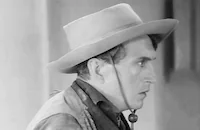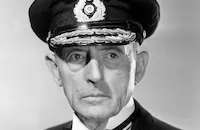Dr. Cyclops
Brief Synopsis
Cast & Crew
Ernest B. Schoedsack
Albert Dekker
Thomas Coley
Janice Logan
Charles Halton
Victor Kilian
Film Details
Technical Specs

Synopsis
When his failing vision no longer permits him to use his microscope, Dr. Alexander Thorkel, the world's greatest living biologist, summons two scientists and a mineralogist to his laboratory deep in the Amazon jungle. The scientists, Dr. Mary Robinson, Dr. Rupert Bullfinch, and mineralogist Bill Stockton, are joined in their expedition by Steve Baker, the owner of the mules they have rented. As soon as the scientists complete their examination of Thorkel's slides, the doctor insists that they leave his camp immediately, but they refuse without first learning the nature of his research. The discovery of a huge uranium deposit makes them even more curious, causing them to break into his lab. Just as they learn that Thorkel has solved the mystery of molecular structure and can shrink living tissue, the doctor bursts into the room and tricks his intruders, along with his servant, Pedro, into the chamber, where he then shrinks them. While he sleeps, his subjects escape, and when he awakens and recaptures Bullfinch, the doctor learns that he is gradually returning to normal size, and so kills him. The remaining four escape into the jungle, but Thorkel tracks them down with the help of Pedro's dog, and Pedro sacrifices his own life for the safety of the others. Their only hope now lies in outwitting the diabolical doctor, and while he sleeps, they steal his spare spectacles and break the lens in his one remaining pair. Awakening in a rage and unable to see with only one eye, the doctor falls to his death in the mine shaft while pursuing his victims. Months later, Mary, Bill and Steve return to normal size and civilization.

Director

Ernest B. Schoedsack
Cast

Albert Dekker
Thomas Coley
Janice Logan

Charles Halton
Victor Kilian
Frank Yaconelli

Paul Fix

Frank Reicher
Allen Fox
Bill Wilkerson
Crew
Gerard Carbonara
Hans Dreier
Farciot Edouart
A. E. Freudeman
Earl Hedrick
Ellsworth Hoagland
Winton Hoch
Henri Jaffa
Gordon Jennings
Natalie Kalmus
Wallace Kelley
Tom Kilpatrick
William Lebaron
Harry Lindgren
Albert Hay Malotte
Joseph H. Morse
Robert Odell
Richard Olson
Henry Sharp
Ernst Toch
Dale Van Every

Film Details
Technical Specs

Award Nominations
Best Special Effects
Articles
Dr. Cyclops
Dr. Cyclops (1940) was directed by Ernest B. Schoedsack and produced by Merian C. Cooper. The Cooper-Schoedsack team had been responsible for one of the greatest fantasy films of all time, King Kong (1933), as well as other movies in the adventure and horror genres, such as The Most Dangerous Game (1932), The Monkey's Paw (1933), The Son of Kong (1933), and The Last Days of Pompeii (1935). Schoedsack was later to say of Dr. Cyclops that the entire production had been "plotted on blueprints" before shooting began. This is no doubt a reference to storyboards used to chart the action, as well as to literal blueprints many elements of the full-size set in which Dr. Thorkel lives and works were reproduced as super-size, to make it appear as if his victims were only inches tall. The attention to detail in these sets is astonishing, and goes a long way in selling the reality of the fantastic story. There were also several excellent process shots in the film, for scenes in which Thorkel towered above the shrunken humans. Gordon Jennings and Farciot Edouart were nominated for an Oscar® for Best Special Effects, but lost to the work in the effects-heavy fantasy classic, The Thief of Bagdad (1940).
At first glance an odd candidate to be given the Technicolor treatment (Dr. Cyclops was the first horror movie since Mystery of the Wax Museum in 1933 to be shot in color), the film benefits greatly from the choice. The lush jungle greens and the eerie glows of the radium chamber give Dr. Cyclops the look of a 1930s science-fiction magazine cover come-to-life; the borderline garishness and tendency for 3-strip Technicolor toward a hyper-realism is in keeping with the pulp nature of the story. It is no accident that the producers convinced Paramount Pictures to go with color photography - Merian C. Cooper had been one of the early investors in Technicolor, and with "Jock" Whitney, had formed Pioneer Pictures in the 1930s to co-produce features in the process.
Writing in The New York Times, reviewer B. R. Crisler found a "camp" value to the film, long before that term had been coined: "...as a cinematic spectacle, Dr. Cyclops is the best bad picture of the year, an epic of silliness, and, more than that, a triumph of the process screen and the department of trick effects all combined very tastefully and what matter if the taste is almost uniformly bad? with Technicolor. In its peculiar way, it is a monument to the ever-expanding universe of the cinema where, occasionally, anything goes, including flagrant violations of the basic physical and chemical laws... It is a pleasure to concede that Paramount has r'ared back and passed a minor miracle: a picture which is frankly terrible, and at the same time one of the most amusing of the season."
In The Encyclopedia of Science Fiction Movies, Phil Hardy calls the film "marvelous," and says it is "gloriously photographed in Technicolor ...and imaginatively directed by Schoedsack." Harday also writes that "The special effects, mostly mattes and back projection, are well executed... but it is the simple central idea that gives the movie its power."
Director Schoedsack is credited with only one other assignment following Dr. Cyclops, the delightful RKO Kong follow-up Mighty Joe Young (1949). Not unlike Dr. Thorkel, Schoedsack had been suffering from failing eyesight for several years. He assisted, without credit, on compiling the prologue for Cooper's introduction to yet another film process, This is Cinerama (1952), but by this time Schoedsack was almost completely blind.
Producer: Merian C. Cooper, Dale Van Every
Director: Ernest B. Schoedsack
Screenplay: Tom Kilpatrick
Cinematography: Winton C. Hoch, Henry Sharp
Film Editing: Ellsworth Hoagland
Art Direction: Hans Dreier, Earl Hedrick
Music: Gerard Carbonara, Albert Hay Malotte, Ernst Toch
Production Design: A. E. Freudeman
Visual Effects: Jan Domela, Paul K. Lerpae
Cast: Albert Dekker (Dr. Alexander Thorkel), Thomas Coley (Bill Stockton), Janice Logan (Dr. Mary Robinson), Charles Halton (Dr. Rupert Bulfinch), Victor Kilian (Steve Baker), Frank Yaconelli (Pedro), Paul Fix (Dr. Mendoza), Frank Reicher (Professor Kendall).
C-76m.
by John M. Miller

Dr. Cyclops
Quotes
Trivia
Luana Walters was originally slated for the role of Mary Logan.
Notes
According to a news item in Hollywood Reporter, this film was to have been the first in Paramount's "weird-chiller" series. In an interview in New York Times, director Ernest Schoedsack explained that the entire technical side of the picture had been plotted on blueprints before shooting began. Gordon Jennings and Farciot Edouart were nominated for an Academy Award in the Special Effects category. Although a pre-production news item in Hollywood Reporter adds that Jane Webb, a Chicago radio actress, was to have her screen debut in this picture, her participation in the final film has not been confirmed.














